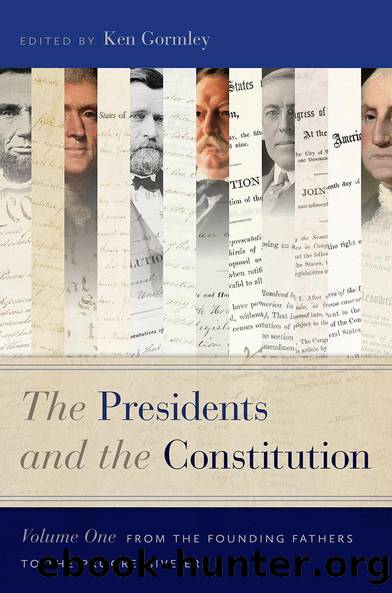The Presidents and the Constitution, Volume One by Ken Gormley

Author:Ken Gormley [Gormley, Ken]
Language: eng
Format: epub
ISBN: 9781479802128
Barnesnoble:
Publisher: New York University Press
Published: 2020-03-24T00:00:00+00:00
The Kansas Debacle
Buchananâs emotional attachment to the South ended up clouding his judgment in his handling of the Kansas controversy. Since 1854, both free- and slave-state advocates had engaged in a bloody conflict in Kansas Territory. To Buchanan, the admission of Kansas as a Democratic-controlled state, with or without slavery, was the primary objective. He appointed a Southerner and former secretary of the treasury, Robert Walker, to serve as the new territorial governor with the promise that he, the president, would only support a state constitution that was submitted to the people of the territory for approval. Walker soon turned to the president for help when free-state men (who opposed slavery) refused to participate in an 1857 election to send delegates to a convention held in the town of Lecompton. The free-statersâ action left a proslavery minority controlling the convention. Not surprisingly, this minority group produced a constitution that permitted slavery and prohibited any changes to the document until 1865.
Fully aware that a majority of Kansans opposed slavery, Walker looked to Buchanan to fulfill the presidentâs pledge to reject a constitution that was not approved in its entirety by a popular referendum. Although Walker had been a U.S. senator from Mississippi and supported slavery, he had accepted the post as territorial governor only on Buchananâs assurances that the popular will of the citizens of Kansas would not be subverted. But under intense pressure from Southern congressmen and governors threatening secession if slavery was not permitted in the territory, Buchanan decided to accept the Lecompton constitution, submitting it to Congress with his full support. Buchananâs decision outraged Walker, who resigned; it even angered Senator Stephen A. Douglas and his followers (members of Buchananâs own party), who believed that the Lecompton constitution repudiated the principle of popular sovereignty enshrined in the Democratic platform of 1856.
The Lecompton bill passed the Senate, but was defeated in the House even though Buchanan tried to cobble together votes by using the power of his office, threatening the removal of Douglas officeholders, awarding contracts to wavering congressmen, and offering patronage jobs.21 Compromise legislation, which permitted a popular referendum on the constitution, eventually passed both houses of Congress. Not only was the proposed Kansas constitution overwhelmingly defeated when both factions voted, but Buchananâs vigorous support of the Lecompton bill shattered his credibility as a national leader and worsened the split in his own party. The Republicans, on the other hand, profited from Buchananâs Kansas debacle, reaping significant gains in the 1858 elections and garnering enough support in Congress to appoint a committee to investigate Buchananâs use of cash incentives and patronage on behalf of the Lecompton bill. The âstrict constructionistâ president, it turned out, seemed to have no qualms about interfering with the legislative process when it came to the slavery issue, and this contradiction of word and deed was exposed.
Party divisions and revelations of corruption within the Buchanan administration severely damaged the Democratsâ chances in the 1860 presidential election. Riddled with in-fighting and other problems, the party nominated two candidates in 1860, with Northern Democrats choosing Senator Stephen A.
Download
This site does not store any files on its server. We only index and link to content provided by other sites. Please contact the content providers to delete copyright contents if any and email us, we'll remove relevant links or contents immediately.
| Civil Rights | Discrimination |
| General | Human Rights |
Day by Elie Wiesel(2252)
The Age of Genius by A. C. Grayling(2177)
Gideon's Spies: The Secret History of the Mossad by Gordon Thomas(1956)
The Gulag Archipelago (Vintage Classics) by Aleksandr Solzhenitsyn(1732)
FATWA: Hunted in America by Pamela Geller(1726)
Columbine by Dave Cullen(1505)
Examples & Explanations: Administrative Law by William F. Funk & Richard H. Seamon(1334)
Men Explain Things to Me by Rebecca Solnit(1323)
The Rule of Law by Bingham Tom(1323)
Anatomy of Injustice by Raymond Bonner(1273)
Three Cups of Tea by Greg Mortenson(1264)
ADHD on Trial by Michael Gordon(1247)
That Every Man Be Armed by Stephen P. Halbrook(1244)
Gideon's Spies by Gordon Thomas(1219)
Palestinian Walks by Raja Shehadeh(1145)
The Source by James A. Michener(1140)
Fast Times in Palestine by Pamela Olson(1123)
Nothing to Envy by Barbara Demick(1045)
Constitutional Theory by Carl Schmitt(1042)
